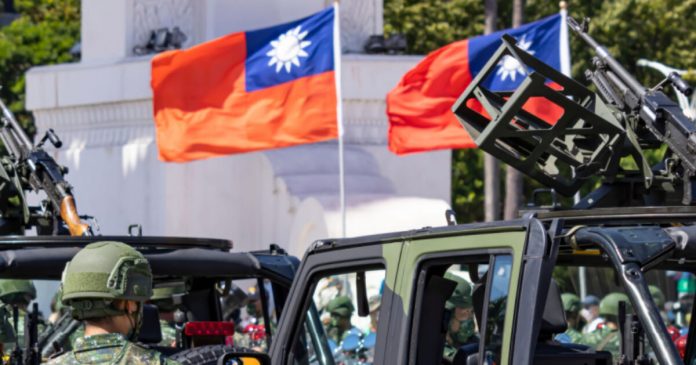After already providing $175 billion in aid to Ukraine, President Biden recently approved an additional $2.4 billion while allocating only $567 million in immediate security aid to Taiwan. Yet, the People’s Republic of China (PRC) poses the greatest near-peer threat to the U.S., aiming to replace America as the global hegemon, possibly preparing for conflict by 2027.
Taiwan, a democratic ally, stands on the front lines of this looming confrontation. Despite warnings from the U.S. military and intelligence community that a clash with China is imminent, Biden continues to prioritize funding for Ukraine while neglecting Taiwan, the likely flashpoint for a U.S.-China war.
Preventing Russia from taking Ukraine is a legitimate concern, but Ukraine is in Europe, where 27 free nations should be funding their own defense, as Trump rightfully demanded. When it comes to defending Taiwan, however, the U.S. is largely on its own. While Europe would face serious consequences if China captured Taiwan—disrupting the global supply of semiconductors and halting shipping through the Taiwan Strait, which handles about 44% of the world’s cargo—European allies remain content to let the U.S. bear the burden of preventing that outcome.
In recent months, China has escalated its aggressive behavior toward Taiwan, frequently violating Taiwan’s air defense identification zone (ADIZ) by sending warplanes and conducting military exercises near its territory. This rising tension holds serious implications for the United States. Taiwan is not only a global leader in semiconductor production, essential for the U.S. economy and defense industry, but its strategic location is crucial for maintaining a U.S. presence in the Indo-Pacific.
Furthermore, unchecked Chinese aggression challenges U.S. global leadership and security commitments, potentially putting American influence and national security at risk. Europe should also be concerned, as a U.S. military engagement with China could weaken America’s ability to continue supporting European defense, leaving the continent more vulnerable.
China has intensified its incursions into Taiwan’s air and sea space, significantly increasing pressure since pro-independence candidate Lai Ching-te’s election as Taiwan’s president. In September 2024, PLA aircraft entered Taiwan’s Air Defense Identification Zone (ADIZ) 322 times, part of a broader campaign that has seen a sharp rise in incursions since Lai’s inauguration, peaking at 439 in July.
Meanwhile, Chinese Coast Guard vessels have entered Taiwan’s restricted waters, particularly around the Kinmen Islands, 42 times in 2024. These aggressive actions, normalized by the PRC, are designed to undermine Taiwan’s control and drain its military resources. While Taiwan refrains from scrambling jets for each ADIZ incursion, the constant strain exhausts its personnel and resources, leaving the U.S. and its allies increasingly concerned about escalating tensions in the region.
While Europe remains distant from Taiwan’s defense, U.S. allies Japan and Australia have provided crucial, though limited, assistance. This has drawn sharp criticism from Beijing, which now claims sovereignty over the Taiwan Strait.
In an October 1 speech marking China’s National Day, President Xi Jinping emphasized opposition to Taiwan’s independence. Xi’s rhetoric, along with that of other Chinese leaders, reflects the PRC’s focus on national unity, modernization, and strength in the face of separatist forces. Beijing also criticized Japan for a joint naval transit through the Taiwan Strait with New Zealand and Australia while continuing to protest international freedom of navigation in the area.
Taiwan’s commitment to its own defense is evident in its Han Kuang exercises, the largest annual military drills simulating various scenarios in the event of a Chinese invasion. These exercises involve the entire population—military forces, civil servants, and even civilians, including women and children, all have roles to play in the island’s defense, and they actively practice these roles during the drills.
The exercises cover joint air, sea, and ground operations, as well as cybersecurity and infrastructure defense, ensuring Taiwan’s preparedness for conflict. Taiwan has also strengthened military coordination with the U.S. through arms sales and intelligence sharing, actively working to bolster its defense against potential threats. Unlike Europe, which scaled back military budgets before the Ukraine war, Taiwan has taken proactive steps to prepare for a confrontation with China.
In conclusion, Europe continues to outsource its defense to the U.S. while viewing Russia as its major threat, yet even after witnessing the invasion of Ukraine, European countries do little to assist the U.S. in defending Taiwan. Despite claiming to take defense more seriously now, Europe still lacks conscription, while Taiwan not only maintains it but is extending the conscription period to bolster its defense against China.
Taiwan is the most likely flashpoint for a global conflict, yet Joe Biden and the Democrats prioritize Ukraine with billions of dollars in aid while offering Taiwan only millions. Taiwan, more critical to U.S. interests, stands alone in the Pacific and requires far greater support. Unlike Ukraine, which could be funded by Europe, Taiwan is making significant efforts to strengthen its own defense, making U.S. aid there a far better investment.
The post Europe Content to Rely on U.S. for Defense, Offering Little Help for Taiwan appeared first on The Gateway Pundit.
This article may have been paraphrased or summarized for brevity. The original article may be accessed here: Read Source Article.





![President Trump Gives Barron A Shout Out At Inaugural Parade: His Unexpected Response is Pure Gold! [VIDEO] president-trump-gives-barron-a-shout-out-at-inaugural-parade:-his-unexpected-response-is-pure-gold!-[video]](https://news.lateawakening.com/wp-content/uploads/2025/01/35545-president-trump-gives-barron-a-shout-out-at-inaugural-parade-his-unexpected-response-is-pure-gold-video-100x70.jpg)



